- Home
- Deborah Smith
The Crossroads Cafe Page 9
The Crossroads Cafe Read online
Page 9
“We could use another hand at poker this weekend. Hey, there are chocolate bunnies in the pot.”
“Ask me next Saturday. My wife’s going to visit her mother in Detroit.”
“Maybe I’ll save you a biscuit. Or maybe not. Depends on whether I ever get my share.”
Delta threw a dishrag at me. “Hush. Here’s ET.” She clicked a remote and the kitchen TV suddenly blared the show’s opening theme. One of the perky blonde hosts appeared on screen. “Big news in the tragic story of Cathryn Deen tonight,” she announced. “Her husband of one year has filed for divorce, and we’ve just learned that an infection has sent Cathryn back to Intensive Care. Doctors are calling her condition serious.”
Delta froze. So did I. When she turned to look at me, she had tears in her eyes.
“She’s going to die,” Delta said.
I shook my head. “Not if I can help it.”
Cathy
Now the whole world knew Gerald had left me.
The malaise that settles on burn survivors a few weeks into treatment is bad enough without being deserted by a loved one. Medical teams work on you as if you’re a lab animal, the drugs steal the time of day, you have no mirrors, you begin to think you don’t exist. Top that off with brutal rejection by the man who vowed to love you forever, and suddenly, you evaporate.
I felt . . . gone.
I lay there in a stupor that pre-Easter afternoon, my ICU cubicle quiet and dark, my mind wandering between painful memories of Gerald and weirdly colored dreams where odd animals slid up the wall then burned to ashes on the ceiling, when a man spoke to me out of the ether of my speaker phone.
“Cathy,” he said quietly, “my name is Thomas, and I’m going to tell you how the sunset looks today over Hog Back Mountain, from the front porch of your Grandmother Nettie’s house.”
The voice was deep, resonant, and vaguely familiar. Had I heard it somewhere before? I associated it with comfort. “Hello, Thomas,” I answered, without opening my eyes. No need to ask for a formal introduction. I knew that voice, somehow. “I’m not having a good day.”
“I know, honey.”
“Can’t figure things out. Why me?”
“I used to believe bad things only happen to other people. But they don’t.”
“Did I deserve this? Can’t see what I did wrong.”
“You didn’t do anything wrong, Cathy.”
Maybe I was just imagining this voice. Maybe an angel was speaking to me. You shouldn’t ignore an angel. “How can you be sure?” I asked.
“I’m an expert on guilt.”
“Tell me why.”
“My wife and son died in an accident. There were things I could have done differently that might have saved them. Or at least saved my son. I was supposed to babysit him that morning, but I had a deadline to meet. My wife and I fought over whose schedule was more important. I insisted she take him with her.”
“Oh, Thomas. I’m sorry.”
“I always believed the people I loved were protected by some magic bubble, just because I loved them. If there is a God, He wouldn’t let anything terrible happen to me or mine. I was a good person. I’d never deliberately hurt anyone, so why should God hurt me? Then something bad did happen, something so awful I couldn’t have imagined it. Everything I believed about fate and luck and fairness went out the window. Ever since, I’ve felt as if I were standing in the ruins of a house I’ve lived in all my life. Logically, I know I can rebuild it, but it’ll never be the same. I don’t know where to start.”
“Empty. So empty. I understand.”
“I’m not a minister, I’m not a philosopher, I’m not a therapist. But I’ve spent a lot of time trying to understand why people suffer. Buddhists say the point is not to explain it, but to embrace it and see what good can come out of it for yourself and others.”
“Buddhists see . . . silver lining.”
“You got it. And Muslims believe suffering is a divine test we all have to take. Do we meet it with hope and patience and courage? They say without suffering there would be no way to salvation.”
“Islam . . . not for sissies.”
“Right. No wiggle room, there.”
“Episcopalians . . . best finger food.”
“What?”
“I was raised Episcopalian. Because . . . my aunts said . . . Episcopalians are more respectable than Unitarians and . . . serve better hor d’oeurves.”
Thomas, my mysterious confident, made a sound. Through the fog of drugs and apathy I realized it was a chuckle. I made him laugh. Imagine. Maybe some part of me was still charming.
“Talk,” I urged. “Keep talking.”
“Okay. Let’s see. Now, Catholics will tell you God works in mysterious ways, and that in order to understand the nature of suffering, we have to be obedient. Not submissive and helpless, but from the root of the word, obedire, from Latin. To listen. My old man sent my brother and me to Catholic school. So I can tell you for a fact that if you don’t listen to a nun, she’ll demonstrate the meaning of the word ‘obedient,’ and you will suffer.”
I managed a little smile. “Funny,” I whispered.
“Not so funny when Sister Angela threw erasers at my head. She had an arm like Roger Clemons.”
“Astros.”
“You know baseball?”
“Clemons, Roger. Cy Young winner, throws a mean slider. My father used to take me to games. The only hobby we shared.”
“Let’s go to a game when you’re well, again. Deal?”
“Deal. Until then, tell me something hopeful.”
“When you lose everything,” he said slowly, “you go blind. All you can do is sit in the dark and wait for the light to come back. It seeps in, here and there, just enough to keep you alive. Your job is to have faith that the light will grow stronger.”
“I’m blind. So blind right now.”
“I know, but don’t give up.”
“Why not?”
“Because we have a date for a baseball game.”
“Okay.”
“I hear you smiling.”
“Lopsided. The bad side hurts.”
He was quiet for a few seconds. Then, gruffly, “I said I’d tell you about the sunset from your grandmother’s porch. You ready?”
“Yes. Sunset. Help me see its light.”
“I’m sitting on the stone steps. They’re deep-gray granite with white quartz veins. The center stones are worn from foot traffic. The outer stones are tinted with green moss around their edges. Tiny, yellow wild flowers are blooming around the foot of the steps and in-between the stepping stones that lead from the porch. I clipped the weeds in the front yard with a swing blade, so sunshine can reach the smallest wildflowers. The whole yard’s a delicate shade of gold.”
“Ah!”
“The huge oaks around the cottage have finally greened out. But they’re still in their spring spectrum. The leaves are pale lime and apple green, tender. By June they’ll be dark green. The oaks have got to be over a hundred years old, all of them. Two people couldn’t link arms around the trunk of the biggest one. They make a natural canopy over the house. The roof could use a little more sunlight—it gets some algae on it in spots, during wet summer weather—but the trees are worth it. Even during the worst heat of August, the yard and the cottage are cool and shady.
“There’s a huge old dogwood in the yard, and it’s covered in cream-colored blossoms right now. The fringe trees bloomed white over a month ago, around the time the crocuses came in. You should see your grandmother’s yard when hundreds of tiny, purple crocuses bloom in a thin layer of snow. It’s as if someone scattered the blooms on a white blanket. The wild azaleas are in bloom right now. There’s a whole thicket of them in the edge of the woods along the pasture. Flame orange. They’re so bright they almost glow in the dark. And the jonquils. The jonquils are blooming. I don’t know how many your grandmother planted in the edge of the front yard originally, but they’ve multiplied over the years, so now t
here are hundreds of them. They cover a good acre or more. Beautiful, egg-yolk yellow trumpets. Everywhere. And there are a pair of giant forsythia shrubs. Enormous. The size of small elephants. Covered in yellow blooms.”
“You . . . know all about flowers and shrubs. Are you a gardener?”
“No, but I’ve done some work that required me to have a basic knowledge of landscape design.”
“You must be a poet at heart. The way you describe things. So pretty.”
“No. I’m just fascinated by details.”
“Then keep giving me details. I love them.”
“All right, let’s see. Later in the year, the Rose of Sharons in your grandmother’s side yard will bloom. They’re twelve-feet tall and a good eight-feet wide. The blooms will resemble big trumpets, like hibiscus. Soft pink. You should see the bees they draw. I’m looking straight down the alley of the front yard, into the river of pasture that runs down the hill. Picture a golf fairway, only turning green with tall grass and lined with the old chestnut posts of pasture fence. I cut the old barbed wire off the posts. It was rusty and broken in places, just a hazard for all the deer who graze around here.
“The alley of pasture draws your eye straight to Hog Back Mountain, which is an extension of the Ten Sisters around the Crossroads Cove. It’s a big hump of a mountain, with a dip on the left end, then a smaller hump, left of the dip—that’s where the name comes from, obviously, because looking at the outline you can imagine the top silhouette of a hog’s head and back. The lower ridges of the mountain are filled with hardwoods, but the top ridges are covered in dark evergreens, so you see this patchwork of different shades. Deep blue shadows fill the hollows and coves on the mountainside, and a white mist rises in the evening, like now.”
“Magic,” I whispered.
“There it goes, the light’s fading. The golds and blues and pinks are being absorbed into the trees, and the balds, and the earth. The mountain’s shadow is stretching right up the alley of pasture and trees toward us, until, in a few more minutes, the cottage will be part of the mountain, just like the sunset. It’s a helluva thing, watching the sun set over Hog Back. It makes you feel like the whole universe is safe inside the mountain until morning.”
“Safe,” I whispered.
“I’m going to send you pictures of your grandmother’s home. Pictures of everything and everyone around the Cove, too. Look at them, memorize every detail, believe what you see. This is a special place. Promise me you’ll get well and you’ll come here and see the sunset from your grandmother’s porch. Promise me, dammit. Don’t give up.”
“I promise,” I whispered. “Keep talking, please. I’m being . . . absorbed by the mountain. I like it.”
“Good. Get some sleep. Fight off that infection. You can do it.”
His name is Thomas, I thought as I drifted off, and I love how he sees me. He must have beautiful eyes.
Thomas
I tucked the phone into my back pocket and leaned against the curved stone arch of Mary Eve’s front porch. On that porch in the middle of the woods, I felt her beside me. Okay, Mary Eve, I kept your house alive. Now you help me keep your granddaughter alive. Deal?
The last ray of light winked at me over Hog Back.
Chapter 6
Thomas Baptist Stone Monkeys
In the midst of Cathy’s downturn, three men drove their rented sedan into the café’s parking lot, armed with cameras. I happened to be at the grocery buying kerosene and canned food—the staples of life at my cabin. The strangers asked everyone where Cathryn Deen’s grandmother used to live. Delta wasn’t on hand to marshal a diplomatic or at least unified response. She was at her house doing chores; she and Pike lived at the end of a shady lane that ambled into the foothills behind the café.
“The Nettie house burned down years ago,” Delta’s brother, Bubba McKellan, told the visitors without looking up from his potter’s bench.
“It was sold to a couple of bikers out of Nashville,” said Cleo, as she tossed empty tomato cartons into the dumpster behind the café. “They’ve turned the whole farm into one of those survivalist schools. Got a lot of guns. And big, mean dogs. Praise Jesus.”
“A bunch of nudists rent the house,” said Becka, while sorting mail at the window of the post office, located inside Jeb’s gem shed. “Outsiders can’t get within shoutin’ distance. Those nudists are tough-skinned when it comes to folks violating their privacy.”
Naked survivalists living in a burned house. Naturally, the visitors weren’t convinced. They walked up to me as I was loading a case of Spam alongside canned vegetables, kerosene, a ten-pack of toilet paper, a case of vodka Jeb picked up for me at the state’s ABC liquor store in Asheville, and a five-pound bag of stone-ground grits produced by an old mill over in Turtleville. Once you adopt grits as part of your diet, you’re a Southerner. It alters your genetic code.
The visitors grinned at my eclectic grocery list. “Dude, you look like a man of the world,” one said. Dude, eh? The others looked at me as if they expected my albino cousin to appear at any moment and start picking a banjo. After nearly four years in the mountains I could affect a decent mountain drawl—or, at least, a hokey, movie-of-the-week imitation. Good enough to fool ignorant asswipes from somewhere else.
“’Shore nuff,” I said drily. “What can I do for y’all?”
“I bet you hunt and fish all over these mountains. I bet you know where to find every old farm and abandoned house.”
“Well, let’s just say I shore nuff know where some bodies are buried.”
They paled a little, then laughed. The lead asswipe said, “Okay, dude, how would you like to make fifty bucks just for taking us on a hike?”
“Fifty bucks! Boy howdy. You must really wanta find some place special, huh?”
“You ever heard of the actress, Cathryn Deen?”
“Why, sure! I seen a movie or two of hers. Boy howdy.”
“We understand she used to visit her grandmother around here. A woman named Mary Eve Nettie. We’re . . . fans of Cathryn’s. We’d like to see her grandmother’s house.”
“Why, there ain’t much to see.”
“Probably not, but we’d love to get a few snapshots. How about a hundred dollars for you to guide us to the place?”
“Wheee, doggy. A hundred dollars!” I ambled over to their sedan. “Tell ya, boys, I’m not sure this here city car could make it up the trail to the Nettie place. Might have to take you in my truck.”
“No problem, dude.”
I peered at the sedan’s back seat. “Got you a pile of camera gear, there! Looks pro-fessional to me! All for a few snapshots! Mighty impressive! You boys work for one of them grocery-store gossip papers or something?”
“Something like that. Then we have a deal?”
“Shore nuff. Load that gear in the back of my truck and I’ll take y’all right now.”
“Cool!”
I waited until they’d loaded about, oh—conservative estimate—ten thousand dollars’ worth of cameras, lens, flash units, and tripods into my truck alongside my groceries. Then I said, “Hold on a minute, I got an idea for how to make more room back here for y’all to sit.”
I fetched a vintage tire iron from beneath the front seat of my vintage truck, and I walked back to them without smiling, and said in my old man’s deadliest, streetwise, Brooklyn voice, “Get outta my way or I’ll splatter your fucking brains all over the parking lot.”
And then, within the course of a few dedicated seconds, as they yelled and dodged and begged and ran, I reduced their camera gear to a gleaming pile of junk.
It would make a perfect new sculpture for The Privy of Fine Art.
I named it ‘Privacy.’
I stood before Judge Benton Kaye at the courthouse in Turtleville. Judge Kaye was the only black man in Jefferson County, except for Anthony the UPS driver. Short and chunky, with a face that hadn’t been helped by a landmine in Vietnam and a stint as a part-time professional boxer during law
school, you’d think the judge would have some sympathy for a disenfranchised outsider like myself. Especially one who played poker with him on Saturday nights at the café, and who had designed and built a gazebo for his wife, Dolores, at her heritage plant nursery.
Instead, Judge Kaye pointed his gavel at me, handle-end first, his fist wrapped around the head so that the gavel stabbed the air like an ice pick, and he said sternly in an accent that belonged to a Corleone, “Those photographers will go back where they came from and tell people we’re all a bunch of violent, inbred rednecks. Including me. I don’t appreciate the irony of that.”
“I understand, Judge. I promise you it won’t happen again. They won’t be back. In fact, I’m guessing they won’t set foot in the entire state of North Carolina again.”
“Your guard-dog attitude wouldn’t be motivated by self-interest, would it? Everybody knows you want the Nettie place all to yourself.”
“Yes, I want the Nettie house. I’ll always want the house. If Cathy Deen ever agrees to sell it, I’ll buy it. But it’s not just that. Her privacy’s been exploited enough. I’m not going to let photographers take pictures of her grandmother’s farm, too.”
“Good intentions are no substitute for the rule of law. I take it you have no remorse for terrorizing three poor, harmless parasites of society and destroying all their equipment?”
“That’s not true, Judge. I do have remorse. I wish I’d taken one more swing at the 400 millimeter lens. I only cracked the casing.”
Benton laid his gavel down. He looked at the court reporter over his reading glasses. “Mrs. Halfacre, rest your fingers for a minute. This is off the record.”
Mrs. Halfacre grinned and put her hands in the lap of a canary yellow dress suit with pink Easter chicks embroidered on the lapels. Benton looked down at me grimly. “There’s something I’ve wanted to ask you for four years. You’re under oath now and I expect you to answer me and answer me truthfully.”
“There’s truth and there’s facts. But I’ll do my best.”

 Legends
Legends Hold on Tight
Hold on Tight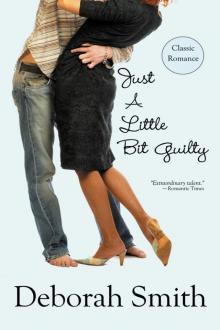 Just a Little Bit Guilty
Just a Little Bit Guilty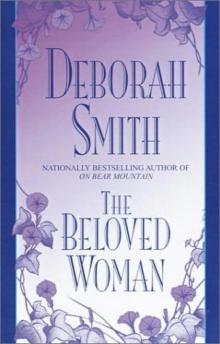 The Beloved Woman
The Beloved Woman Alice At Heart
Alice At Heart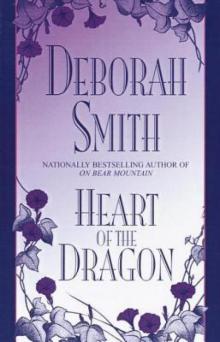 Heart of the Dragon
Heart of the Dragon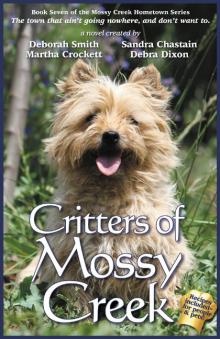 Critters of Mossy Creek
Critters of Mossy Creek Diary of a Radical Mermaid
Diary of a Radical Mermaid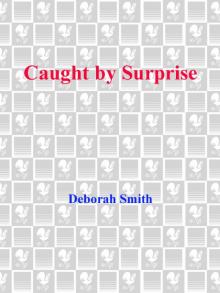 Caught by Surprise
Caught by Surprise Stranger in Camelot
Stranger in Camelot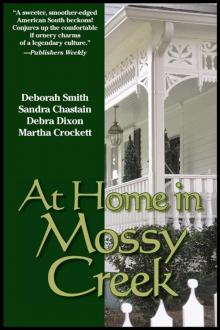 At Home in Mossy Creek
At Home in Mossy Creek Charming Grace
Charming Grace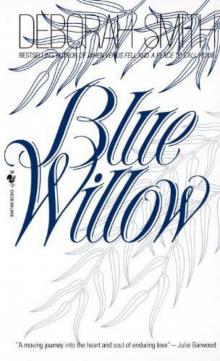 Blue Willow
Blue Willow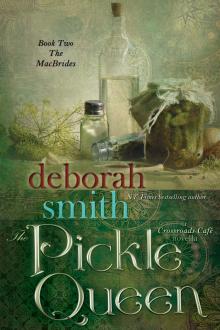 The Pickle Queen: A Crossroads Café Novella
The Pickle Queen: A Crossroads Café Novella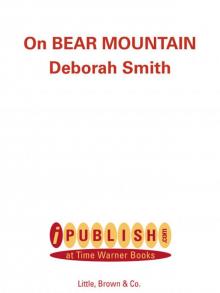 On Bear Mountain
On Bear Mountain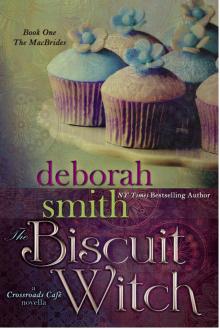 The Biscuit Witch
The Biscuit Witch Sara's Surprise
Sara's Surprise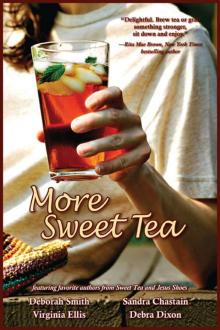 More Sweet Tea
More Sweet Tea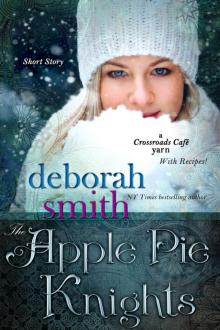 The Apple Pie Knights
The Apple Pie Knights The Silver Fox and the Red-Hot Dove
The Silver Fox and the Red-Hot Dove Sweet Hush
Sweet Hush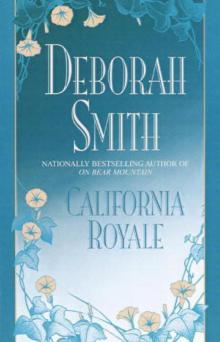 California Royale
California Royale Hot Touch
Hot Touch Miracle
Miracle The Stone Flower Garden
The Stone Flower Garden A Place to Call Home
A Place to Call Home Silk and Stone
Silk and Stone Honey and Smoke
Honey and Smoke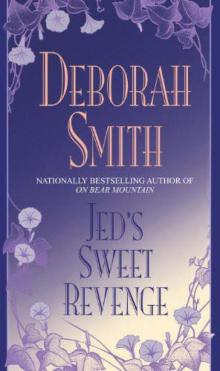 Jed's Sweet Revenge
Jed's Sweet Revenge Silver Fox and Red Hot Dove
Silver Fox and Red Hot Dove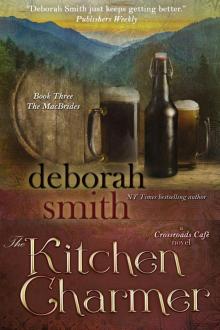 The Kitchen Charmer
The Kitchen Charmer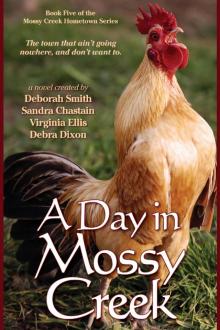 A Day in Mossy Creek
A Day in Mossy Creek Never Let Go
Never Let Go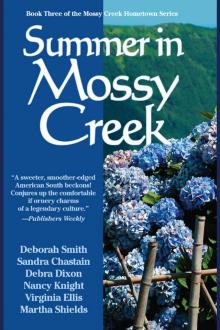 Summer in Mossy Creek
Summer in Mossy Creek On Grandma's Porch
On Grandma's Porch The Crossroads Cafe
The Crossroads Cafe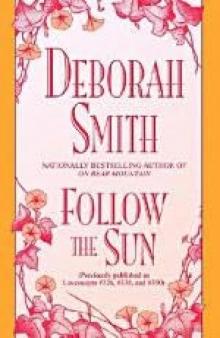 Follow the Sun
Follow the Sun The Yarn Spinner
The Yarn Spinner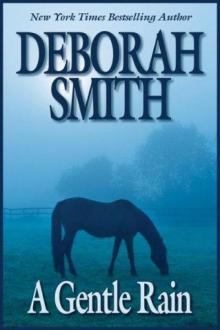 A Gentle Rain
A Gentle Rain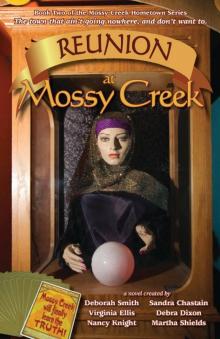 Reunion at Mossy Creek
Reunion at Mossy Creek